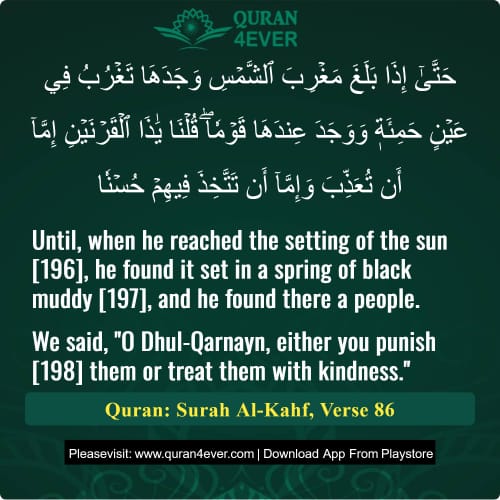
Transliteration:( Hattaaa izaa balagha maghribash shamsi wajadahaaa taghrubu fee 'aynin hami'a tinw wa wajada 'indahaa qawmaa; qulnaa yaa Zal Qarnaini immaaa an tu'az ziba wa immaaa an tattakhiza feehim husnaa )
"Until, when he reached the setting of the sun [196], he found it set in a spring of black muddy [197], and he found there a people. We said, 'O Dhul-Qarnayn, either you punish [198] them or treat them with kindness.'"
This refers to the farthest western region that Dhul-Qarnayn reached, beyond which no known civilization existed. It was a region of quagmire and icebergs, symbolizing the end of habitable land. The verse does not contradict scientific facts—it describes what appeared to him visually at the edge of the known world.
Since the earth is spherical, the sun does not literally set into water or mud. Instead, it disappears from view, just as it seems to a person standing at the shore or in the desert.
What he saw was that the sun appeared to be setting into a dark, muddy spring—which could refer to murky or icy waters. In regions of extreme cold, water takes the form of icebergs or thick, black mud. This is a description of visual appearance, not a literal location of the sun.
This reflects the local phenomenon of the horizon—just like a traveler at sea sees the sun dipping into the ocean, even though it's an illusion of perception.
Upon reaching this region, Dhul-Qarnayn encountered a people, and Allah said to him:
“Either punish them or treat them with kindness.”
This highlights that Allah had given him divine authority to govern, judge, and enforce justice. He was allowed to choose between punishment or mercy, showing his role as a just ruler under divine guidance.
This verse also reflects a principle of governance: those entrusted with power by Allah must balance justice with mercy, based on the circumstances of the people they are dealing with.
The tafsir of Surah Kahf verse 86 by Ibn Kathir is unavailable here.
Please refer to Surah Kahf ayat 85 which provides the complete commentary from verse 85 through 88.
(18:86) until when he reached the very limits where the sun sets,[63] he saw it setting in dark turbid waters;[64] and nearby he met a people. We said: “O Dhu al-Qarnayn, you have the power to punish or to treat them with kindness.”[65]
63. “The setting place of the sun” does not mean the place of the setting of the sun. According to Ibn Kathir, it means that he marched to the west conquering one country after the other till he reached the last boundary of the land, beyond which there was ocean.
64. “He found it setting in a muddy spring”: If Zul Qarnain was Cyrus, then that place would be the western limit of Asia Minor and the black waters would be the Aegean Sea. This interpretation is supported by the use of the word ain instead of bahr in the Quran.
65. “We said” does not necessarily mean that Allah directly revealed to him these words, and that Zul-Qarnain was a Prophet or was the one who received inspiration from Allah, and the same is the reasonable conjecture. This concerns the time when Zul-Qarnain had taken possession of the land as a conqueror and the conquered people were utterly at your mercy. Then Allah posed a question before his conscience, as if to say: Now is the time of your trial. These people are utterly at your mercy, and you have the option either to behave unjustly towards them or to treat them generously.
[795]- Another meaning is "a body of hot water."

For a faster and smoother experience,
install our mobile app now.
Related Ayat(Verses)/Topics